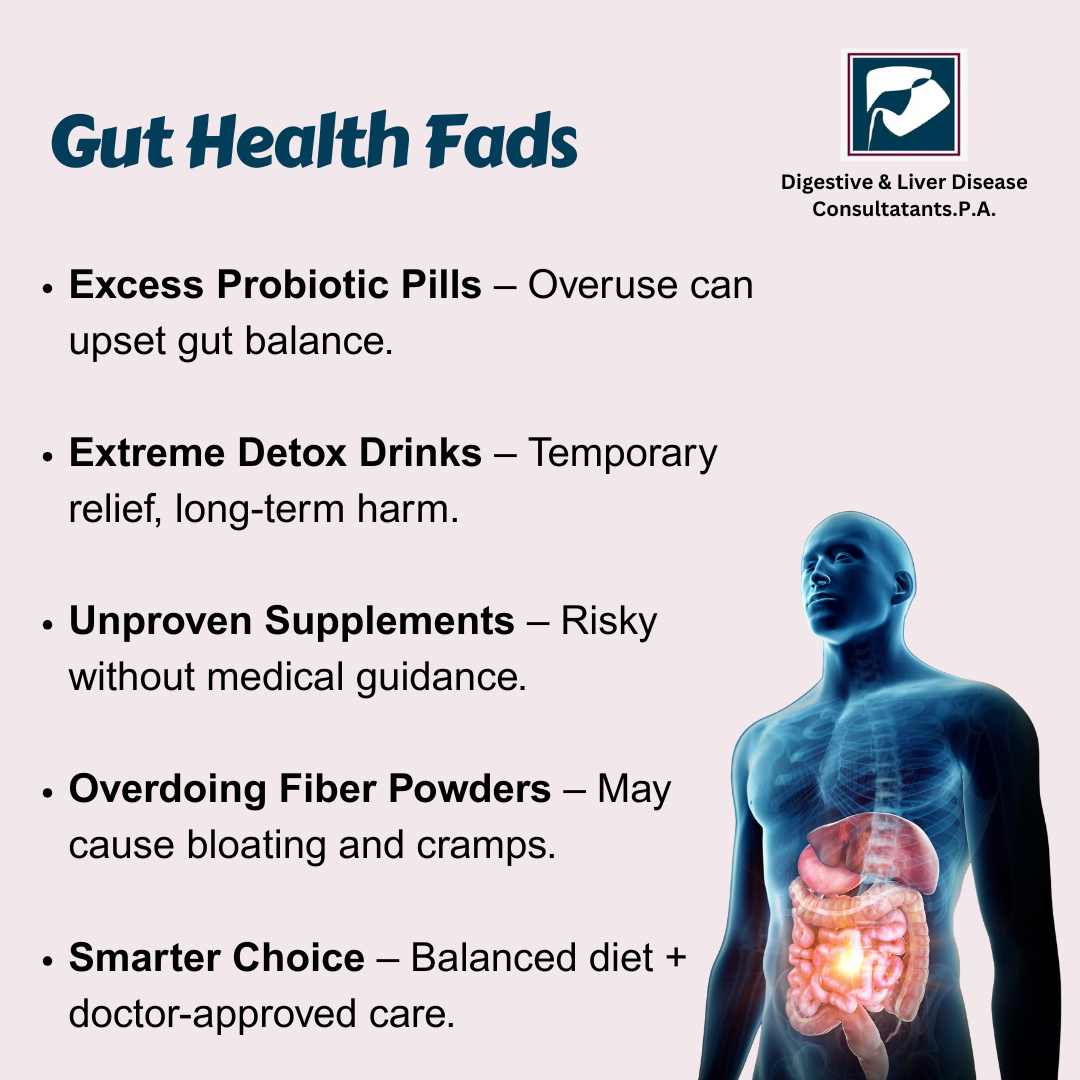Gut health has become one of the most talked-about wellness topics in the United States. From social media influencers to wellness brands, everyone seems to have advice on how to keep your digestive system in top shape. While the growing interest in digestive health is a good thing, not all of these so-called solutions are safe or effective. Many gut health fads can do more harm than good.
If you have ever felt confused about what truly works and what does not, you are not alone. In this blog, we will look at common gut health fads to avoid and smarter, science-backed choices you can make to support your digestive system.
Why Gut Health Matters
Your gut does much more than digest food. It helps break down nutrients, supports your immune system, influences metabolism, and even impacts your mood. A healthy gut is made up of a balanced microbiome, which includes trillions of bacteria and microorganisms. When this balance is disrupted, you may experience symptoms like bloating, constipation, diarrhea, or abdominal pain. Over time, poor gut health can also contribute to more serious issues such as irritable bowel syndrome (IBS), inflammatory bowel disease (IBD), and liver disease.
With so much at stake, it is important to make decisions based on medical evidence rather than following every new trend online.

Common Gut Health Fads to Avoid
Detox Teas and Juice Cleanses
These products claim to flush toxins from your body and reset your gut. In reality, your liver and kidneys already do an excellent job of natural detoxification. Detox teas often contain laxatives that may lead to dehydration, electrolyte imbalances, and digestive dependency. Juice cleanses may deprive your body of protein and healthy fats, leaving you fatigued and malnourished.
Extreme Elimination Diets
Cutting out entire food groups like carbs, dairy, or gluten without medical guidance can cause nutrient deficiencies. Unless you have a diagnosed condition such as celiac disease or lactose intolerance, elimination diets may do more harm than good. They may also increase stress around food and make healthy eating harder to sustain.
Overusing Probiotic Supplements
Probiotics have become very popular for gut health, but more is not always better. Not all probiotic supplements are scientifically tested, and taking them in excess may upset the natural balance of your microbiome. In some cases, they may even cause bloating and discomfort. Instead, try getting probiotics from natural food sources like yogurt, kefir, sauerkraut, or kimchi.
Believing in “Superfood Cures”
While foods like apple cider vinegar, turmeric, or ginger have health benefits, they are not miracle cures for digestive problems. Relying on a single food or supplement will not fix an unhealthy gut. Gut health is about overall balance, not quick fixes.
Gut Reset Programs
Programs that claim to “reset your gut” in just a few days are misleading. Your gut health cannot be restored overnight. Many of these programs involve expensive powders, restrictive diets, or untested supplements that lack real medical evidence.
Smarter Choices for Better Gut Health
Instead of following risky fads, focus on habits that are proven to support your digestive system.
Eat a Balanced Diet
Whole foods such as fruits, vegetables, whole grains, lean proteins, and healthy fats provide the nutrients and fiber your gut needs. A balanced diet supports digestion, prevents constipation, and feeds healthy gut bacteria.
Include Prebiotics and Probiotics Naturally
Prebiotics are plant fibers that feed good bacteria in your gut. They are found in bananas, garlic, onions, and oats. Probiotics add more healthy bacteria to your system and are naturally found in fermented foods. Together, they promote a strong and diverse microbiome.
Stay Hydrated
Water plays an important role in breaking down food and moving it through your digestive tract. Staying hydrated also helps prevent constipation and supports nutrient absorption.
Manage Stress
The gut and brain are closely connected. Stress and anxiety can trigger bloating, cramps, and other digestive issues. Practices such as meditation, yoga, and regular exercise can help reduce stress and improve gut function.
Exercise Regularly
Movement encourages healthy bowel activity and supports metabolism. Even a daily walk can improve your digestive health and overall wellness.
Get Professional Guidance
If you experience ongoing digestive symptoms, do not rely on online trends or self-treatment. A gastroenterologist can help identify the real cause and recommend safe, effective treatments.
About Digestive & Liver Disease Consultants, P.A.
At Digestive & Liver Disease Consultants, P.A., we are committed to helping patients achieve better digestive and liver health. Our board-certified gastroenterologists provide expert care for conditions such as acid reflux, irritable bowel syndrome, inflammatory bowel disease, fatty liver disease, hepatitis, and more.
We use advanced diagnostic tools and treatment methods to create personalized care plans for every patient. Whether you are dealing with common digestive discomfort or a complex liver condition, our team is here to guide you with compassion and medical expertise.
With locations across the Houston area, we make it easier for patients in Texas to access high-quality digestive health care. Our focus is on long-term wellness, not quick fixes, so you can feel confident knowing that your health is in the right hands.
Conclusion
Gut health plays an important role in your overall well-being, but not every trend you see online is safe or effective. Detox teas, extreme diets, and quick-fix supplements may sound appealing, but they often lead to more harm than good. Smarter choices such as eating a balanced diet, staying hydrated, managing stress, and seeking professional care can make a real difference in your digestive health.
Schedule an appointment with the expert gastroenterologists at Digestive & Liver Disease Consultants, P.A. Our team will help you understand your symptoms, create a personalized treatment plan, and guide you toward lasting digestive wellness.






